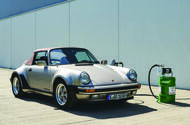Doubts Mount Over Europe’s E-Fuels Exemption for Combustion Engines

Introduction
Last year, there was news that combustion-engine cars would be exempt from a ban in the European Union after 2035, as long as they run on carbon-neutral e-fuels. This exemption was celebrated by its supporters in Germany. However, there are doubts about the European Commission’s true intentions, with BMW CEO Oliver Zipse suspecting a de facto ban on combustion engines.
Concerns Raised by BMW
BMW CEO Oliver Zipse expressed suspicion that the European Commission is using e-fuels as a way to relax the ban on combustion engines without actually supporting them. He believes that if the Commission does not accelerate the development of low-CO2 fuels and make their use practical, it would effectively ban combustion engines through indirect means.
The Role of E-Fuels
E-fuels are synthetic fuels produced using green hydrogen and carbon. They are created by separating water into hydrogen and oxygen through electrolysis, then combining the hydrogen with CO2 from the air to produce a liquid energy carrier. However, the production of e-fuels is energy-intensive and requires renewable electricity sources.
The Carbon-Neutral Requirement
The European Commission has stated that any fuels used for new vehicles with combustion engines sold after 2035 must be climate-neutral. This requirement aligns with the EU’s goal of reaching net-zero CO2 emissions by 2050. However, it also demands that the electricity used in the production of e-fuels comes from renewable-energy generators that wouldn’t have been built otherwise, to avoid diverting green energy from the grid.
Pressure from Germany
The German government, led by transport minister Volker Wissing, is urging the EU to revise the carbon-neutral requirement to make it fully carbon-neutral. Wissing argues that a provision should be found that allows the use of synthetic fuels with internal combustion engines. Some within the Commission have suggested a 70% reduction in carbon emissions instead.
Challenges and Opposition
E-fuels are currently expensive to produce, and there is uncertainty about whether their price will drop quickly enough to incentivize energy companies to invest in large-scale production. Some car manufacturers, including BMW, Porsche, and Ferrari, support e-fuels because they still see profit in combustion-engine vehicles. However, others, such as Stellantis, Volvo, and Ford, have expressed concerns. Green groups are generally against e-fuels, considering them a threat to investments in battery technology.
Future Debate
The future of e-fuels after 2035 remains a highly debated subject in the European Union and the UK. Extending the use of combustion engines would require continued legislation to govern their emissions. Additionally, there is a challenge in ensuring that e-fuel-certified combustion-engine cars are not filled with traditional fuels instead. The automotive industry may become less concerned about making money from electric vehicles by 2035, as customers become accustomed to charging rather than refilling.

